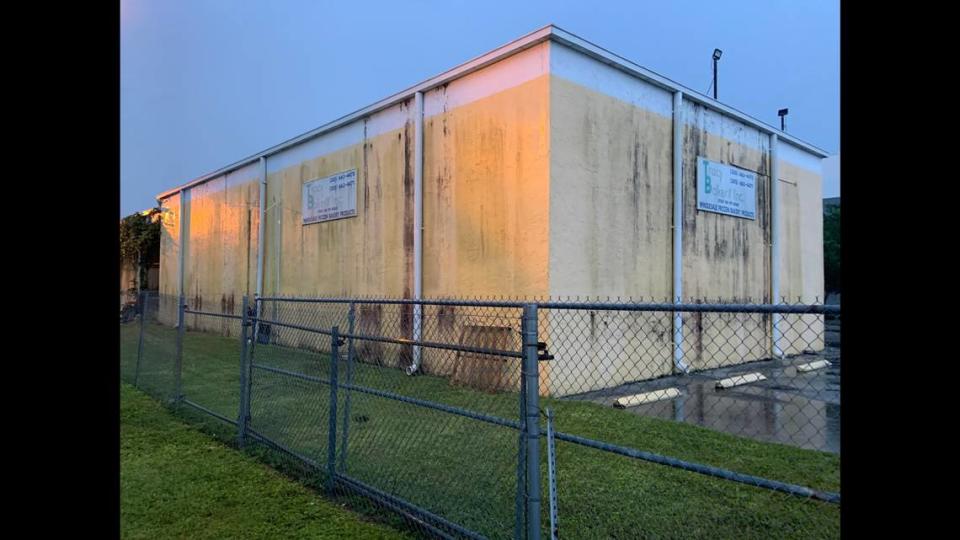Miami baker of Cuban bread and pastelitos for retail stores fails inspection — again
A state inspector found slime and mold at the Miami area bakery that might make the pastelitos sold in your convenience store, the Cuban or Puerto Rican bread in your supermarket or the crackers at your restaurant.
On Thursday, for the second time in less than six months, Tracy Bakery failed a Florida Department of Agriculture inspection and managed to repeat some of the violations from September’s failed inspection.
Tracy Bakery’s website says: “We operate as a leading commercial Hispanic bakery making our products available to you through traditional supermarkets and their in-store deli/bakeries, foodservice distributors, convenience stores, mass merchandisers, club stores, wholesalers, and quick-serve restaurants to list a few.”
Failed Ag Department inspections don’t automatically close a facility, and the bakery at 17501 SW 99th Rd. remains in operation cranking out the carbs. But Inspector Raymond Collada will be back before April 11 for a re-inspection.
Here’s what Collada found Thursday and what he found on Sept. 26 (Tracy passed a re-inspection on Oct. 12):
Slime, holes and mold on March 28
▪ “Employees are not trained in the principals of food hygiene and food safety.”
▪ “The ice chute inside the maker room was found heavily encrusted with slimy product residue along the outside and exterior portion of the ice chute.” The inspector dropped a Stop-Use Order on the ice machine until someone properly cleaned and sanitized it.
▪ The handwash sink in the pastelito processing room not only lacked soap, paper towels, wasn’t “maintained clean” and was “hanging from the wall, not properly attached.”
▪ Also, the plumbing underneath that sink and the ware washing sink leaked because “the pipes are not connected so that the water doesn’t drain directly onto the floor.”
▪ That handwash sink sat cheek-by-jowl with the floor mixer. “There is no splash guard to protect food being mixed in the mixer while an employee washes hands.”
▪ Still in the pastry room, “the hopper filled with guava paste wasn’t covered .... while the area above was found with some mold-like residue on the ceiling.”
▪ In the bread dough room, Inspector Collada saw “heavy dust accumulation on the top areas on the dough mixer, the hopper line and vents above the processing (area).”
▪ An employee went without hair restraint while processing dough.
▪ “Employees leaving and re-entering the processing room without washing hands before beginning processing.”
▪ Inspector Collada “observed holes in the walls leading out of the building from the processing room that weren’t covered or protected. The side door leading outside to the back of the building isn’t screened to protect against pests.”
▪ “Several areas of the facility” including processing areas and coolers possessed “uneven floors, pitted and holding stagnant, pooling water.”
▪ The “fluorescent lights above the bread table in front of the ovens aren’t protected, covered or shielded in case of breakage, to protect against contamination of the food production area.”

The Sept. 26 inspection
▪ “The food establishment has not registered the food facility as required by the FDA.”
▪ Dough in the dough processing area walk-in cooler was spotted “not covered during the rising step, located inside the cooler.”
▪ As for the cooler itself, it was “not maintained in good condition, black mold-growth in several areas.”
▪ “Observed several employees not washing hands after changing tasks, re-entering the processing rooms.”
▪ Another handwashing problem: the handwash sinks were “not equipped with hand soap or hand sanitizer as required.”
▪ The faucet handles for “several handwash sinks weren’t maintained clean.” They were “encrusted with dried dough, and food residue.”
▪ Speaking of the handwash stations, “several hand washing stations were not in good repair, leaking from underneath” with “plumbing not properly sealed or attached. Buckets found underneath catching water.”
▪ The water heater wasn’t working, so the water at the handwash stations couldn’t get hot enough.
▪ In the processing rooms, bread and dough areas, “the fluorescent bulbs located directly above food products are not protected or shielded in the case of breakage.”
▪ “Walls, ceilings and floors located throughout the facility not maintained in good repair. The floors throughout are not even. (They’re) pitted and holding water.”
▪ The “walls and ceiling inside the refrigeration are in poor condition (with) insulation coming detached from the wall and ceiling.” Inspector Collada did note that “no leaking or damaged product observed” but the walls had “black mold-like buildup.”
▪ The bread manufacturing area’s ice chute was “heavily rusted with some slimy residue built up along the exterior portion of the ice chute.” And this is a problem because “ice is used as an ingredient in the manufacture of frozen bread dough which passes through the ice chute.”
▪ “Some food equipment, mixers and machines found with some dried food particles encrusted.” Also, Inspector Collada saw “heavy rusting on several machines.”
A Stop-Use Order hit the entire processing area, lifted only after proper cleaning.

